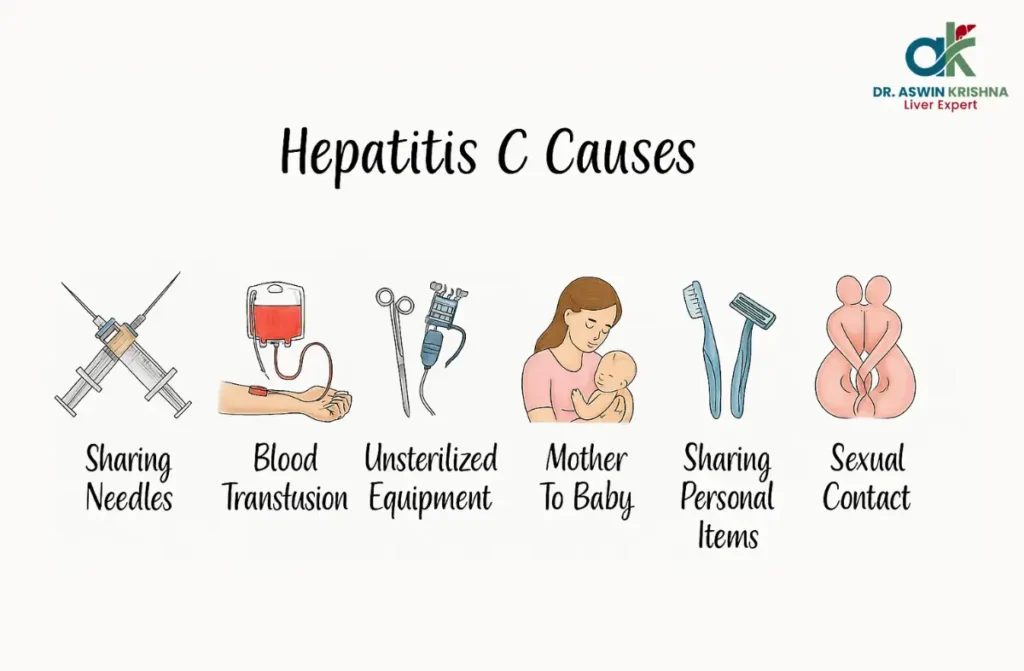Hepatitis C is a silent threat that affects millions worldwide. Comprehending the gravity of this potentially devastating disease is essential for effective prevention and treatment. In this comprehensive guide, we will delve into the nuances of Hepatitis C, shedding light on its causes, symptoms, available treatments, and the importance of support for those diagnosed with this condition. For those seeking the best hepatitis C treatment in Chennai, this guide aims to provide valuable insights and resources.
What is Hepatitis C?
Hepatitis C is a viral infection that primarily affects the liver, leading to inflammation and, in severe cases, liver damage. It’s caused by the Hepatitis C virus (HCV) and can range from a mild illness lasting a few weeks to a serious, lifelong condition. For those dealing with this condition, seeking Hepatitis C treatment in Chennai is crucial for managing and potentially curing the infection.
How is Hepatitis C Transmitted?
Hepatitis C is predominantly transmitted through contact with infected blood. This can occur through:
- Sharing needles or other drug-injecting equipment.
- Receiving a blood transfusion or organ transplant before 1992, when blood screening became standard.
- Being born to a mother carrying Hepatitis C.
- Less commonly, through unprotected sex, especially if there are other sexually transmitted infections present.
- Unsafe medical practices, such as improper sterilization of medical equipment.

Types of Hepatitis C Infection
Hepatitis C infections are classified based on how long the virus has been in the body:
- Acute Hepatitis C: A short-term infection that occurs within the first six months after exposure. Some people may clear the virus on their own without treatment.
- Chronic Hepatitis C: When the infection persists for more than six months, it is considered chronic, potentially leading to long-term liver damage such as liver cirrhosis or liver cancer.
Knowing the type of infection helps doctors determine the best treatment for hepatitis C in Chennai for each patient.
Symptoms
- Many people with early hepatitis C have no symptoms, which delays diagnosis and care. When present, early signs can include fatigue, low-grade fever, nausea, and discomfort in the upper right abdomen due to liver inflammation. Recognizing these subtle cues can prompt timely hepatitis C treatment in Chennai.
- Jaundice sometimes appears, causing yellowing of the eyes and skin with dark urine and pale stools. This results from bilirubin buildup when inflamed liver cells cannot process it efficiently. Mild itching and loss of appetite may accompany jaundice, adding to daily discomfort.
- Chronic infection can lead to persistent tiredness, poor concentration, and sleep disturbances. Muscle and joint aches are also common, and some patients report mood changes. These non-specific features can be mistaken for routine stress, further prolonging undetected disease.
- Extrahepatic clues include skin rashes, Raynaud-like cold sensitivity, and swelling from mixed cryoglobulinemia. Some develop thyroid problems or insulin resistance, reflecting the infection’s immune and metabolic effects. Early recognition supports evaluation and access to hepatitis C treatment in Chennai before irreversible liver damage occurs.
Risk factors
- Sharing needles or injection equipment remains the strongest risk factor. Transmission occurs when microscopic blood on syringes, cookers, filters, or water enters another person’s bloodstream. Harm-reduction services and rapid linkage to hepatitis C treatment in Chennai reduce ongoing risk.
- Transfusions or organ transplants before robust screening, hemodialysis, and needlestick injuries in healthcare settings increase exposure. Non-sterile medical or dental procedures also pose risk when infection-control practices lapse. Recognizing these exposures enables targeted screening and timely hepatitis C treatment in Chennai.
- Tattoos or piercings performed with inadequately sterilized tools can transmit infection. Informal or home settings are especially risky if single-use needles and proper autoclaving are not guaranteed. Choosing licensed providers who follow stringent sterilization protocols is protective.
- Sexual transmission is less common but higher with HIV, traumatic practices, or genital ulcers. Household transmission can occur through shared razors, nail clippers, or toothbrushes contaminated with blood. People who have been incarcerated, or who use intranasal drugs and share straws, also warrant testing.
Diagnosis
- Initial screening uses an anti-HCV antibody test. A positive result indicates past exposure but does not confirm active infection. Confirmatory HCV RNA testing determines current viremia and guides linkage to hepatitis C treatment in Chennai.
- Where available, HCV core antigen testing is an alternative when RNA assays are limited. Reflex testing pathways—automatically running RNA after a positive antibody—reduce missed follow-up. Access to reliable hepatitis C tests in Chennai streamlines this process.
- Baseline evaluation includes liver enzymes, complete blood count, and non-invasive fibrosis staging with elastography (FibroScan) or serum indices (APRI, FIB-4). Abdominal ultrasound screens for structural disease, and patients with advanced fibrosis require hepatocellular carcinoma surveillance. Consultation with the best doctor for hepatitis c treatment in Chennai ensures appropriate staging and care.
- Co-infection screening for HIV and hepatitis B, medication review for interactions, and vaccination for hepatitis A and B are standard. Pangenotypic therapies have minimized the need for genotype testing, but clinical nuances still matter. Well-organized pathways for hepatitis C tests in Chennai support same-day diagnosis and faster cure, improving outcomes with hepatitis C treatment in Chennai.
Treatment
- Modern direct-acting antivirals (DAAs) cure more than 95% of patients within 8–12 weeks. Regimens such as sofosbuvir/velpatasvir or glecaprevir/pibrentasvir are pangenotypic, well tolerated, and pill-based. Choosing the best treatment for hepatitis c in Chennai involves tailoring duration and monitoring to fibrosis stage and co-morbidities.
- Pre-treatment checks include drug–drug interaction review, renal function, and pregnancy considerations. Most non-cirrhotic, treatment-naïve adults complete therapy in eight to twelve weeks and return for sustained virologic response testing at twelve weeks post-therapy. Collaboration with the best doctor for hepatitis c treatment in Chennai optimizes adherence and outcomes.
- Practical planning addresses affordability and access. Programs that disclose the hepatitis C treatment cost in Chennai, and clarify the cost of hepatitis C treatment in Chennai under insurance or assistance schemes, help patients stay on therapy. Clear counseling reduces missed doses and prevents reinfection.
- Multidisciplinary clinics coordinate addiction medicine, mental health, and hepatology. This integrated approach supports the best treatment for hepatitis c in Chennai while minimizing barriers. Rapid initiation, friendly follow-ups, and reminders ensure more people complete hepatitis C treatment in Chennai effectively and safely.
Complications
- Untreated infection may progress to fibrosis and cirrhosis over years. Cirrhosis can decompensate, causing ascites, variceal bleeding, encephalopathy, or jaundice that requires urgent care. Early hepatitis C treatment in Chennai prevents progression for most patients.
- Chronic inflammation increases the risk of hepatocellular carcinoma, even after cure in those with advanced fibrosis. Lifelong ultrasound surveillance every six months is recommended for patients with cirrhosis. Timely detection allows curative options such as ablation or resection.
- Extrahepatic complications include cryoglobulinemic vasculitis with rashes, neuropathy, and kidney involvement. There is also elevated risk of insulin resistance, type 2 diabetes, and certain lymphomas due to immune dysregulation. Successful antiviral therapy often improves or resolves many of these manifestations.
- Advanced liver disease impacts daily life through fatigue, frailty, and medication restrictions. Hospitalizations and procedures increase financial and emotional strain for families. Preventing these outcomes through prompt hepatitis C treatment in Chennai preserves quality of life.
Prevention
- There is no vaccine, so prevention relies on reducing exposure to infected blood. Single-use syringes, sterile medical equipment, and rigorous infection-control practices are foundational safeguards. People who inject drugs benefit from needle-syringe programs and opioid substitution therapy.
- Do not share razors, toothbrushes, nail clippers, or any item that may contain microscopic blood. Choose licensed tattoo and piercing providers that use sterile, single-use needles and well-maintained sterilization systems. These steps sharply cut transmission risk in community settings.
- Screening people with risk factors enables early cure and breaks chains of transmission. Clear information on hepatitis C treatment cost in Chennai and the cost of hepatitis C treatment in Chennai supports uptake of care by addressing financial concerns. After cure, avoid re-exposure and continue protective habits.
- Condom use is advised when there is bleeding risk, genital sores, or for people with HIV. Healthcare workers should follow standard precautions and prompt post-exposure evaluation. Normalizing screening and access to hepatitis C treatment in Chennai builds a safer environment for everyone.
What is an effective way to stop the spread of Hepatitis C?
- Adopt a “test-and-treat” approach: normalize screening in primary care, dialysis units, antenatal services, and addiction programs, then start curative DAAs quickly. When most people with detectable virus are cured, community viral load falls and transmission declines. Rapid linkage pathways to hepatitis C treatment in Chennai are central to this strategy.
- Pair treatment with harm-reduction: free sterile syringes, safe injecting education, and opioid substitution therapy reduce new infections among people who inject drugs. Integrating these services with antiviral clinics keeps care continuous and practical. This combination sustains long-term declines in incidence.
- Implement micro-elimination: focus on high-risk settings such as prisons, hemodialysis centers, and HIV clinics. On-site screening, point-of-care RNA confirmation, and same-day dispensing remove logistical barriers. Coordinated care with the best doctor for hepatitis c treatment in Chennai ensures consistent cure rates.
- Maintain public and patient education: discourage sharing of sharp personal items, promote safe tattooing, and encourage disclosure of past exposures to clinicians. Clear pathways into hepatitis C treatment in Chennai, alongside transparent information about hepatitis C treatment cost in Chennai, make it easier for people to start and finish therapy. Together, these steps interrupt transmission sustainably.
Getting Tested for Hepatitis C
Early detection is crucial for the effective hepatitis C treatment in Chennai. If you think you have been exposed to the virus, it is essential to undergo hepatitis C tests in Chennai. Testing can identify the presence of the virus even before symptoms appear, increasing your chances of successful treatment.
Some of the key tests include:
- Antibody Test: Identifies if you’ve ever been infected with HCV.
- RNA Test: Confirms if the virus is currently in your blood.
- Genotype Test: Determines the type of Hepatitis C virus to choose the best treatment plan.
Why Choose Hepatitis C Treatment in Chennai?
- Expert Care: Chennai is home to some of the best gastroenterologists and hepatologists who specialize in Hepatitis C treatment in Chennai.
- Advanced Facilities: The city’s top hospitals are equipped with state-of-the-art diagnostic and treatment facilities.
- Comprehensive Care: From screening and diagnosis to treatment and follow-up, patients receive comprehensive care tailored to their needs.
Conclusion
Hepatitis C is a formidable foe, but with the right information and resources, it can be overcome. Whether you are searching for the best treatment for Hepatitis C in Chennai or simply seeking support, remember that knowledge is a powerful tool in the fight against this viral infection. Together, we can create a supportive community and raise awareness about Hepatitis C, ultimately contributing to a healthier future for all.
Read also Best Hepatologist in Chennai Apollo Hospital.
